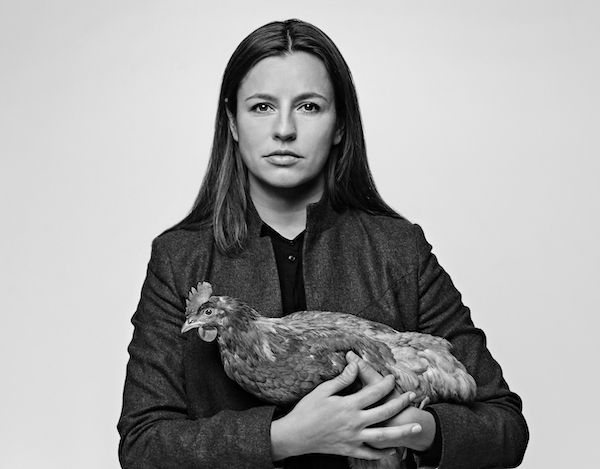Jan 13, 2026 2:09 PM
More Trump-Kennedy Center Cancellations
The fallout from the renaming of the John F. Kennedy Center for the Performing Arts to include President Donald…

Seeing a Charles Lloyd performance changed the trajectory of Maria Faust’s creative life.
(Photo: Kaupo Kikkas)Growing up in remote Kuressaare, a small island village in Communist Estonia, saxophonist and composer Maria Faust had no exposure to jazz.
“I heard mostly Soviet propaganda music, funeral marching bands, classical music, some folk music, choir music and, of course Estonian pop and rock,” she said. “There’s this famous propaganda poster that proclaims, ‘Today you play jazz, tomorrow you betray your country.’”
She knew she was a musician from a very young age, despite growing up in a family of nonmusicians. “Not that I would become a musician, but that I already was,” she said. “No one really knew what was up with the kiddo talking about composing and practicing and drawing piano keys on paper.”
When Faust was 8, her single mother put herself into debt purchasing a piano for the precocious composer. And when she was 14, Faust picked up the saxophone, but put it aside when it didn’t fit into her formal studies. She pursued classical music early on, but didn’t discover jazz until she heard a concert by Charles Lloyd in Tallinn, the nation’s capital, at the Jazzkaar Festival when she was 18.
“I was blown away.”
She returned to the saxophone.
Faust’s talent for writing, arranging and improvising within the jazz tradition have been made clear by the stunning recordings she’s made since settling in Copenhagen, Denmark—where she earned her Ph.D. at the prestigious Rhythmic Music Conservatory. But what’s more compelling and impressive is her refusal to hew to any single musical lineage.
Indeed, she’s an inveterate explorer fueled by deep intellectual curiosity.
“I make music for myself, so as my interests change, my music changes,” Faust, 40, said. “I want to try it all. I need music to dance to, scream to—and spiritual music. I’m a really emotional and instinctive person, so my choices in projects are not calculated well in advance. I find something, explore it, and run with it at full speed until there’s a natural end point.”
She’s also staunchly true to herself and as much as she chafed against the rigidity of education early on, she also accepts and takes a certain pride in it. On her website she has insisted, “I am a child of communism! I did not swing. I marched!”
She’s imaginatively and fruitfully pulled from her upbringing with a practice she calls “memory analysis,” drawing upon collective memory, forgiveness, historical research and more innate recollections, such as the sound of water, which she has called “a natural and unpredictable force of oppressed feelings like anger and sorrow.”
Last year’s ravishing Machina (Stunt), a drummerless chamber-jazz recording, featured field recordings of lapping water, passing boats and the creaking of an old ship hull. This spring, she dropped a viscerally grinding trio recording with the New York rhythm section of drummer Weasel Walter and bassist Tim Dahl called Farm Fresh (Gotta Let It Out), with a focus on her fiery alto playing. She also performs in an experimental electronic trio called Shitney—with Danish singer Qarin Wikström and guitarist Katrine Amsler.
While Faust pours her heart into such projects with total commitment, her greatest work has been with mid-sized bands that deploy her “memory analysis,” such as Jazz Catastrophe and Sacrum Facere, which released a gorgeous 2014 album inspired by Estonian folklore and runic singing. She later collaborated with the Danish pop singer Kira Skov for In The Beginning (Stunt), which “used repetition and prayer as compositional tools” to forge a stunning hybrid of Estonian folk and sacred music, jazz improvisation and sophisticated pop melodies, enhanced by a traditional choir. A new Sacrum Facere is due next year, featuring church organ, and Faust has also been commissioned to compose a Mass. For balance, a second Shitney album is also scheduled to drop. DB

Belá Fleck during an interview with Fredrika Whitfield on CNN.
Jan 13, 2026 2:09 PM
The fallout from the renaming of the John F. Kennedy Center for the Performing Arts to include President Donald…

Peplowski first came to prominence in legacy swing bands, including the final iteration of the Benny Goodman Orchestra, before beginning a solo career in the late 1980s.
Feb 3, 2026 12:10 AM
Ken Peplowski, a clarinetist and tenor saxophonist who straddled the worlds of traditional and modern jazz, died Feb. 2…

The success of Oregon’s first album, 1971’s Music Of Another Present Era, allowed Towner to establish a solo career.
Jan 19, 2026 5:02 PM
Ralph Towner, a guitarist and composer who blended multiple genres, including jazz — and throughout them all remained…

Rico’s Anti-Microbial Instrument Swab
Jan 19, 2026 2:48 PM
With this year’s NAMM Show right around the corner, we can look forward to plenty of new and innovative instruments…

Richie Beirach was particularly renowned for his approach to chromatic harmony, which he used to improvise reharmonizations of originals and standards.
Jan 27, 2026 11:19 AM
Richie Beirach, a pianist and composer who channeled a knowledge of modern classical music into his jazz practice,…